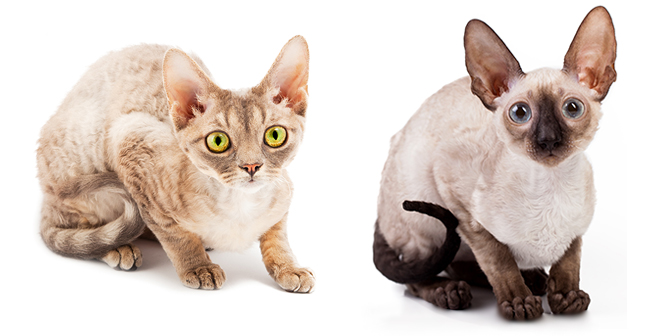
It can be easy to confuse these two cat breeds, as both hail from the United Kingdom, and both have the word “Rex” in their name. However, in spite of their many similarities, there are certain distinctions between the breeds that set them apart. Find out more about the Devon Rex and his cousin from the seaside city of Cornwall, the Cornish Rex cat.
The Devon Rex is often easier to identifier than the Cornish Rex, because of several features that distinguish this breed from others. The Devon is described as having a “sprite-like” pixie or alien kind of appearance (which almost resembles the Star Wars character Yoda) due to its head shape, and the positioning of the large, low-laying ears. They have noticeably short, almost invisible whiskers near their up-turned noses. Their legs are more muscular and sturdy than the Cornish Rex cats’ and their toes are unusually large.
The Cornish Rex has more of a typical cat-like, egg shaped head with what has been called a strong “Roman nose” and pronounced chin. These cats are agile and ballerina-like with their narrow spines and long delicate legs. They also have a robust chest and smaller waist than the Devon Rex. The Cornish Rex’s fine coat makes them best suited for indoor living, as they lack the double layer many cats possess. This breed is active, and will often be found playing fetch, leaping and racing around.
Common Pricing
Devon Rex: $400
Cornish Rex: $450
Coat Texture
Devon Rex: The Devon’s coat is curly, short and silky.
Cornish Rex: The Cornish Rex’s coat is a light undercoat, soft, curly and can be quite long. The Cornish Rex has now “guard” or down hair, unlike the Devon. In spite of the possibility for longer hair, the Cornish Rex is lower maintenance than the Devon Rex.
Color
Both cats can be black, white, smoke, blue, cream, red, brown, or tortoiseshell, etc. The pattern possibilities vary between the pets. Devons can be spotted, tabby, or mink primarily, while Cornish Rex cats can be multi-colored, bi- colored, tabby, tickled or van.
Devon Rex cats live a minimum of 10 years usually, but can live up to 15 years if they are cared for well and given good nutrition. Conversely, the Cornish Rex only lives an average of 11-12 years total.
Devons are larger than Cornish Rex cats, weighing 8-10 lbs instead of an average Cornish Rex, weighing 6-9lbs. That said, between the two breeds, it is the Cornish Rex that has fewer health complications and physical ailments than the Devon Rex cats do. (Devons struggle with hip dysplasia, myopathy, malassezia dermatitis, and urticaria pigentosa, which the Cornish cats are seldom assailed with.)

